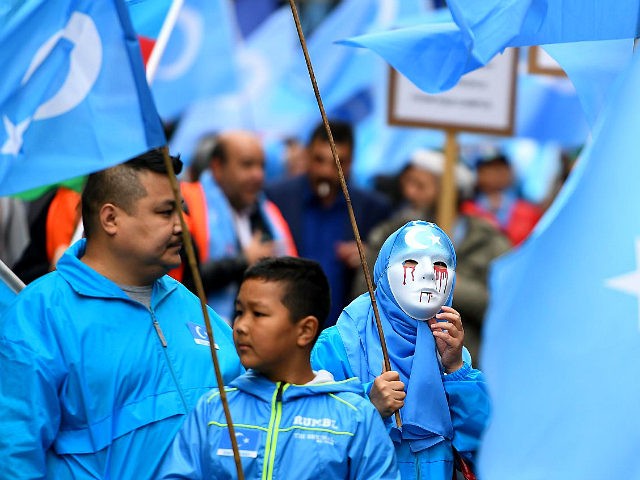Over 200 businessmen from China’s top ally Pakistan are complaining that their Uighur Muslim wives have been caught in the net of Beijing’s crackdown on Islam adherents and are urging Beijing to release them, the Associated Press (AP) reported Monday.
In September, Islamabad demanded that Beijing take “urgent steps for the release of over 50 Chinese wives” of Pakistani men arrested in predominantly Uighur Muslim Xinjiang province, home to hundreds of so-called re-education camps allegedly used to imprison up to one million Uighur, Kazakh, and other minority Muslims from China.
Now, over 200 Pakistani men reportedly say China is holding their Uighur Muslim wives prisoner at one of the re-education camps, also known as mind-transformation centers, where detainees are forced to renounce their religion in favor of Communist Party leader Xi Jinping’s ideology.
“A steady stream of Pakistani men has visited Beijing in recent months, lobbying for the release of their wives to little avail. Some say they met Pakistan’s ambassador to China, Masood Khalid, on multiple occasions, and were told their issues were raised privately with the Chinese,” AP reported.
The U.S. and the United Nations have accuse d China of forcing hundreds of thousands of Muslims — mainly from the country’s Uighur minority ethnic group but also Kazakhs and Kyrgyz — into the re-education camps.
Arguing that the concentration camps are vocational and educational centers aimed at combatting terrorism and religious extremism, China has repeatedly denied the detainees are subjected to communist indoctrination and are facing systemic torture, disappearances, executions, arbitrary detentions, as well as suppression of cultural and religious life, among other crimes, at the facilities.
Nevertheless, Chaudhry Javed Atta, one of the Pakistani businessmen complaining that China has imprisoned their wives, told AP, referring to the re-education camps, “They call them schools, but they are prisons. They can’t leave.”
AP revealed:
Atta is one of scores of Pakistani businessmen — and he says there are more than 200 — whose spouses have disappeared, taken to what Chinese authorities tell them are education centers. … Pakistanis often rally loudly in defense of Islam and Muslims whenever they are perceived offended around the world. … But political and economic factors, including concerns about losing out on vast Chinese investments, have kept Pakistan and other Muslim countries silent about the plight in China of fellow Muslims, the Uighurs.
China is financially-strapped Pakistan’s top ally in Asia.
AP noted, “China is financing major development projects in cash-strapped Pakistan. Islamabad says Beijing’s up to $75 billion development project known the China-Pakistan Economic Corridor — part of an effort to reconstruct the historic Silk Road linking China to all corners of Asia — will bring new prosperity to Pakistan, where the average citizen lives on just $125 a month.”
Pakistan has spoken against China’s alleged human rights abuses at the re-education camps, marking “one of the first public criticisms from a majority Muslim country over China’s policies in the western territory,” the Guardian reported.
The Guardian pointed out that Pakistan has blasted China for its Uighur policy, urging Beijing to soften restrictions on the minority in Xinjiang in the wake of reports of abuses and repression.
Pakistan-occupied Kashmir — a region claimed by Islamabad, New Delhi, and Beijing — shares a border with Xinjiang.
“The Muslim world’s deafening silence about China’s treatment of Muslims can be attributed to its strong interest in maintaining close relations with the world’s next superpower,” Michael Kugelman, deputy director of the Asia Program at the Washington-based Wilson Center, told AP.
Mushahid Hussain, chairman of Pakistan’s Senate Foreign Affairs Committee, reportedly conceded that “the cardinal principle” of the Islamabad-Bejing relationship is to remain silent on domestic issues.
“Given the relationship of Pakistan with China, and in the Muslim world in particular, the Chinese narrative is apparently being accepted across the board as the one that is correct,” Hussain declared.
China’s state-run Global Times urged Islamabad to adopt measures that mirror those implemented by Beijing in Xinjiang to protect Chinese citizens in Pakistan.
The U.S.-China Economic and Security Review Commission has acknowledged that China faces an Islamic terrorist threat from its ally Pakistan and to a lesser extent war-ravaged Afghanistan.

COMMENTS
Please let us know if you're having issues with commenting.